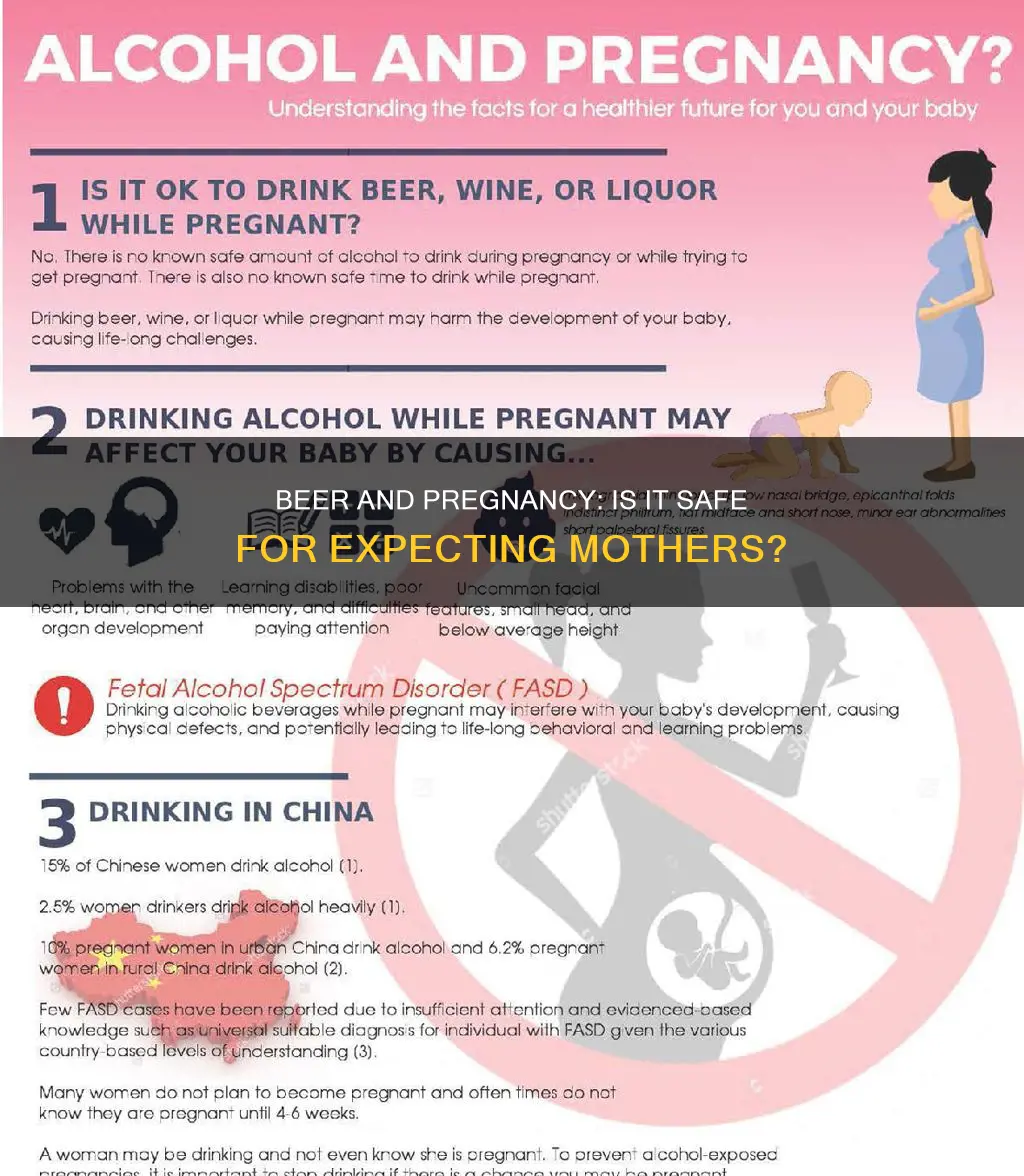
Beer is a popular alcoholic drink, and many people enjoy it as a refreshing beverage. However, when it comes to pregnancy, there are important considerations to keep in mind. The question of whether beer or any alcoholic drink is healthy for a pregnant woman has been a subject of debate and ongoing research. While some studies suggest that light drinking during early pregnancy may not have negative effects, the general consensus among medical professionals is that there is no safe level of alcohol intake during pregnancy. Alcohol consumption during pregnancy has been linked to fetal alcohol spectrum disorders (FASD), which can cause physical, cognitive, and behavioural complications in children. To eliminate any potential risks to the developing fetus, complete abstinence from alcohol is recommended during pregnancy.
What You'll Learn

No safe amount of alcohol during pregnancy
While opinions vary on whether it is safe to drink alcohol during pregnancy, medical professionals generally advise against it. The consensus is that there is no safe amount of alcohol consumption during pregnancy.
According to the CDC and the U.S. Surgeon General, there is no known safe amount or time to consume alcohol during pregnancy. The American Academy of Pediatrics also advises against drinking during pregnancy, stating that there is no safe amount of alcohol for a pregnant woman. Evidence-based research has found that even small amounts of alcohol can increase the risk of miscarriage, stillbirth, premature birth, or sudden infant death syndrome.
The potential risks of alcohol consumption during pregnancy are not fully understood. However, heavy drinking is known to cause birth defects and developmental issues, including fetal alcohol spectrum disorder (FASD). FASD can cause physical abnormalities, such as abnormal facial features and small head size, as well as learning disabilities, speech and language delays, and other neurological issues.
Some studies suggest that light or moderate drinking may not have adverse effects on the baby. For example, a 2012 Danish study found that low to moderate alcohol consumption during pregnancy did not affect executive functioning in 5-year-olds. Additionally, a study published in the Journal of Epidemiology and Community Health reported that children of women who drank up to one to two alcoholic drinks per week or on occasion while pregnant did not show increased behavioural or cognitive problems at age five. However, the authors noted that developmental problems could emerge later in childhood.
Despite the varying opinions and research findings, the safest course of action is to abstain from alcohol entirely during pregnancy. The potential risks to the developing baby are significant, and there is no known safe amount or type of alcohol that can be consumed without risk. Pregnant women should consult their doctors for individual advice and guidance.
Beer vs. Pop: Which Beverage is Healthier?
You may want to see also

Fetal alcohol spectrum disorder (FASD)
Alcohol crosses the placenta, exposing the baby to similar alcohol concentrations as the mother. This can interfere with the development of the baby's brain and other critical organs, leading to deficits after birth and beyond. Research shows that binge drinking and heavy drinking during pregnancy put the baby at the highest risk for severe problems. However, even lesser amounts can be harmful, and there is no known safe amount of alcohol consumption during pregnancy.
The effects of FASD on the fetus include harm to the development of the fetal nervous system, including the brain, and under-nourishment of the growing baby. In some cases, alcohol exposure can trigger changes in the development of the baby's face, resulting in certain facial features such as a thin upper lip, small eye openings, and a flattened philtrum (the usually ridged area between the upper lip and nose).
Babies severely affected by FASD are at risk of dying before birth, and those who survive may experience lifelong challenges. Individuals with FASD may have difficulty with learning, attention, memory, hyperactivity, social skills, and performing daily life skills. FASD can also lead to secondary disabilities, including medical, educational, mental health, and social challenges.
The risk of FASD is highest when prenatal exposure to alcohol occurs regularly or due to frequent binge drinking. To prevent FASD, it is recommended that women who are pregnant or planning to become pregnant abstain from consuming alcohol altogether.
Hard Seltzer vs Beer: Which is the Healthier Choice?
You may want to see also

Drinking alcohol while breastfeeding
The risks associated with drinking alcohol while breastfeeding are similar to those of drinking during pregnancy. Excessive alcohol consumption can lead to decreased milk supply, sleep problems, impaired cognitive development, and abnormal weight gain in the infant. It is recommended that breastfeeding mothers avoid drinking more than 14 units of alcohol per week and allow at least 2 hours after drinking before breastfeeding to minimise the amount of alcohol passed to the baby.
Some studies have found that moderate alcohol consumption, such as one drink per day, may not have harmful effects on the baby. However, it is important to note that the long-term effects of alcohol consumption while breastfeeding are still unknown.
Non-alcoholic beer is often considered a safer alternative during breastfeeding, but it is important to note that these drinks may still contain higher levels of ethanol than indicated on their labels. The effects of ethanol on breastfed infants are less certain, but it has been detected in breast milk after consumption of non-alcoholic beer. As such, it is recommended to briefly delay breastfeeding after consuming any alcoholic beverages, including non-alcoholic beer, to ensure the infant is not exposed to alcohol.
Overall, while the occasional drink is unlikely to cause harm, regular drinking above the recommended limits can be harmful to both the mother and the baby. It is important for breastfeeding mothers to make informed decisions about alcohol consumption and seek advice from healthcare professionals if needed.
Two Beers a Night: Healthy Habit or Slow Poison?
You may want to see also

Binge drinking during pregnancy
There is consensus that heavy and consistent alcohol consumption throughout pregnancy can lead to birth defects and neurological issues in the child. However, the specific effects of binge drinking, in isolation from regular heavy drinking, are less clear. A review of research published in the British Medical Journal found little substantive evidence that binge drinking during pregnancy seriously harms the fetus. They noted that binge drinking may have some impact on neurodevelopment, but the overall effects were generally small.
Despite the lack of conclusive evidence of harm, most health organizations and experts recommend that pregnant women avoid binge drinking. The reason for this precautionary approach is that there are still unknowns regarding the effects of alcohol on the developing fetus, and it is better to minimize any potential risks. Additionally, binge drinking can increase the risk of miscarriage, stillbirth, and abnormal birth weight.
The debate around binge drinking during pregnancy highlights the complex balance between individual rights and responsibilities. While some women feel judged or restricted by guidelines recommending total abstinence from alcohol during pregnancy, others appreciate the need for caution. Ultimately, it is a personal decision that should be made based on the available information and each woman's acceptance of risk.
In conclusion, while the research on the effects of binge drinking during pregnancy is ongoing, it is generally advised that pregnant women avoid binge drinking to minimize any potential risks to the developing fetus. More comprehensive studies are needed to fully understand the impact of binge drinking on pregnancy outcomes and fetal development.
The Pros and Cons of IPA Beer Consumption
You may want to see also

Drinking alcohol before knowing you're pregnant
Official guidelines from the Centers for Disease Control and Prevention (CDC) and the National Health Service (NHS) in the United Kingdom advise that women who are pregnant or trying to conceive should avoid alcohol completely. This is because there is no known safe amount of alcohol during pregnancy, and drinking can cause a range of issues for the baby known as fetal alcohol spectrum disorders (FASD). These disorders can include serious central nervous system issues, developmental problems, and specific physical characteristics. However, the potential effects of small amounts of alcohol are not well understood, and some studies suggest that light drinking early in pregnancy may not be harmful.
A 2013 study published in the journal Obstetrics and Gynecology found that drinking small amounts of alcohol during early pregnancy did not increase the risk of high blood pressure complications, premature birth, or low birth weight. Similarly, a 2012 Danish study found that low to moderate alcohol consumption during pregnancy did not affect executive functioning in 5-year-olds. However, a 2014 study in the United Kingdom suggested that even fewer than two drinks per week in the first trimester increased the risk of complications such as lower birth weight and pre-term birth.
It's important to note that drinking alcohol during pregnancy can also increase the risk of miscarriage and stillbirth. Additionally, heavy drinking during pregnancy has been linked to a long-term and irreversible condition known as fetal alcohol syndrome (FAS). FAS can cause physical and developmental problems, including characteristic facial features such as a thin upper lip and small eyes.
If you drank alcohol before knowing you were pregnant, it's recommended to talk to your healthcare provider about your concerns and to stop drinking for the remainder of your pregnancy.
Beer Brats: Healthy or Harmful?
You may want to see also
Frequently asked questions
There is no clear consensus on whether it is safe to drink beer during pregnancy. Some doctors recommend completely avoiding alcohol when pregnant, while others say that occasional light drinking is unlikely to harm the baby. However, it is important to note that there is no known safe level of alcohol intake during pregnancy, and heavy drinking can cause birth defects and other complications.
Drinking beer or any other alcoholic beverage during pregnancy can increase the risk of fetal alcohol spectrum disorder (FASD), which includes physical, cognitive, and behavioral complications in the baby. It can also lead to miscarriage or stillbirth and increase the baby's risk of sudden infant death syndrome (SIDS).
Non-alcoholic beers can still contain up to 0.5% alcohol by volume, and there is limited research on their effects during pregnancy. While some studies suggest that light drinking during early pregnancy may not have negative effects, there are no clear guidelines on how much alcohol is safe. Therefore, it is recommended to consult with a healthcare provider and exercise caution when considering consuming non-alcoholic beers during pregnancy.







